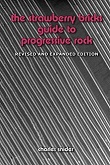/PAlogo_v2.gif) |
|
Post Reply 
|
Page <123> |
| Author | ||
djfake 
Forum Groupie 

Joined: June 10 2008 Location: Chicago Status: Offline Points: 71 |
 Posted: March 20 2009 at 18:21 Posted: March 20 2009 at 18:21 |
|
Please give this another listen. It's much more than "a Hammond Organ in a blues key". |
||
|
Author, "The Strawberry Bricks Guide to Progressive Rock"
www.progressiverock.com |
||
 |
||
Rank1 
Forum Groupie 
Joined: March 26 2008 Status: Offline Points: 53 |
 Posted: March 21 2009 at 08:38 Posted: March 21 2009 at 08:38 |
|
Well I have to disagree with you respectfully.
I feel the Beatles were certainly progressive when especially George Harrison was working at a sophisticated level of extrapolating Indian scales to the Western setting, something no one else had done in rock music as compared to efforts like the Byrds or the Yardbirds. "Love You To", which is certainly derived from classical Indian, "Within You Without You", "The Inner Light", and even "Norwegian Wood" follows the raga khamaj avarohana is an unaltered raga were in the Indo/Prog category. One more song "
|
||
 |
||
progvortex 
Forum Senior Member 
Joined: September 21 2008 Status: Offline Points: 242 |
 Posted: April 08 2009 at 23:47 Posted: April 08 2009 at 23:47 |
|
|
This book is sitting on my desk right now! Awesome guide, I bring it everywhere I go.
|
||
|
Life is like a beanstalk... isn't it?
|
||
 |
||
kenic 
Forum Newbie 
Joined: December 03 2009 Status: Offline Points: 1 |
 Posted: December 03 2009 at 03:33 Posted: December 03 2009 at 03:33 |
|
|
Progressive rock has been the object of many essays and guides but “The trawberry bricks guide to progressive rock” written by Charles Snider (2007) figures among the top of the list due to a brilliantly documented work. This practical book conciliates descriptive, analytical and critical approches, focusing the subject on the golden era of progressive rock, also reserving a place to the historical roots of this musical scene. Before opening the guide with a representative list of classic (pre) progressive albums published between 1968 and 1979, Charles Snider starts the essay with a prologue appropriate to a discussion around the historical situation / musical context and about specific aesthetic / formal elements that distinguish progressive rock to conventional, standard pop music. The restrospective list and reviews that accompagny the guide cover all the progressive rock musical spectrum (from symphonic prog, jazz rock, art rock to krautrock and electronic prog). This essay is obviously focused on the giants of progressive rock but it also gives an important mention to obscure bands that are now cult (Clearlight, Heldon, Far East Family Band, Birth Control...). Consequently this guide can ravish all fans of prog rock classic period. It contributes to an ecclectic, global comprehension to the developpement of the genre. This is a massive, complex collection but there’s only one negative point I would like to notice: When the author speaks about the emergence of prog rock musical identity I estimate that too many attention is given to low musical pop-ish aspects introduced by the Beatles...I would like to read a more exhaustive chapter about the influences of high musical spheres that don’t belong to rock music, I mean classical music, free-jazz, sixties minimalism, raga meditations and avant garde. Highly recommended and definitely a good introduction to progressive rock magical / timeless musical world.
|
||
 |
||
djfake 
Forum Groupie 

Joined: June 10 2008 Location: Chicago Status: Offline Points: 71 |
 Posted: February 11 2010 at 15:37 Posted: February 11 2010 at 15:37 |
|
|
Not sure if this got a mention here, but I was on NPR as a guest on Sound Opinions. You can here us talk about progressive rock here:
Sound Opinions http://www.soundopinions.org/shownotes/2009/111309/shownotes.html thanks for all the good words! |
||
|
Author, "The Strawberry Bricks Guide to Progressive Rock"
www.progressiverock.com |
||
 |
||
djfake 
Forum Groupie 

Joined: June 10 2008 Location: Chicago Status: Offline Points: 71 |
 Posted: February 11 2010 at 19:35 Posted: February 11 2010 at 19:35 |
|
|
Thanks Paul!
|
||
|
Author, "The Strawberry Bricks Guide to Progressive Rock"
www.progressiverock.com |
||
 |
||
fuxi 
Prog Reviewer 
Joined: March 08 2006 Location: United Kingdom Status: Offline Points: 2459 |
 Posted: March 09 2010 at 02:35 Posted: March 09 2010 at 02:35 |
|
|
I haven't bought the book, but I'm impressed with your selection of artists and albums, which is in the best possible taste. It includes virtually everything I would have wanted to include myself, PLUS a good deal of music I've never heard, though it sounds very intriguing. Judging from the excerpts that can be read on Google Books, the reviews are brief but informative and really likable. Probably the best possible "prog rock primer" now available!
|
||
 |
||
Evolutionary Sleeper 
Special Collaborator 

Honorary Collaborator Joined: December 30 2008 Location: Berkeley, CA Status: Offline Points: 7037 |
 Posted: March 09 2010 at 15:03 Posted: March 09 2010 at 15:03 |
|
I use it mainly as a reference book, not really something to read from cover to cover. Good book though. |
||

|
||
 |
||
AtomicCrimsonRush 
Special Collaborator 

Honorary Collaborator Joined: July 02 2008 Location: Australia Status: Offline Points: 14256 |
 Posted: July 21 2010 at 06:38 Posted: July 21 2010 at 06:38 |
|
|
The Strawberry Bricks website was one of the first to get me deeper into prog - before i discovered this site that is :)
|
||

|
||
 |
||
moshkito 
Forum Senior Member 
Joined: January 04 2007 Location: Grok City Status: Offline Points: 16165 |
 Posted: September 07 2010 at 20:25 Posted: September 07 2010 at 20:25 |
|
This is probably not true, either. India was not born yesterday and they have had rock bands doing their music right with/after the Beatles, and I would say, that it is very likely that this mix was out there before. Are you suggesting that India was a third world country that had no electric guitars? Or drums? What should be said, is that our ears had not heard those mixtures yet .... but to think that no musician had ever tried or done it before is ... not complete. There were a lot of classical musicians that did a lot of work with Eastern musicians and Isaac Stern and Yehudi Menuin just about made their names with it. And Yehudi is responsible for bringing Ravi Shankar to the West, not The Beatles as far as I can remember and tell. I had already heard Ravi Shankar way before Sgt Peppers had come out!
The issue here is publicity and media ... one did not hear, or understand, as much music as we can today ... so the east/west mix was really big in the 60's ... but today is not important, even in the context of the development of "progressive music". And the simplistic attitude that it is discussed with is not a good ingredient for helping the book be more widely accepted and understood. Specially when it's history is ignoring some advances in America like FM radio, which almost single handedly put "progressive music" in the map, until 5 years later it became just another AM radio station playing top hits ... or worse ... classics!
I don't dislike the book. I find it incomplete and lacking and way too generalized ... and I don't think that we can make things better unless PA gets it on ... we have the best here ... and you don't have to rely on books that ... do not measure up? But we consider it better simply because it was published and we don't credit this board at all ... and the book is also toally clueless about any other art that is related to the music, be it directly or indirectly ... and as such they take away the "soul" of a lot of music. To me, and many others, "Epitath" is not a progressive music anthem ... it is one of the most important anti-war statements ever put together ... with the exception that you don't know what a war is and what it entails and it is simpler to call it "progressive" and forget the rest? Sorry ... not all of us are members of the ignorance is bliss department of music knowledge, and specially this board, where the knowledge is outtasight!
I just think that it's time that PA take a step forward and become THE book on the subject! And we even incorporate the interviews, which so many of these books don't.
Btw, there are two of those books out there that have my pictures of Gong showing and I am not given the credit for it ... shouldn't that give you an idea of how generic and reckless and thoughless something like that is?
We just need to convince Dean and a couple of other people here ... we need to become the ultimate progressive bible and information place ... not some second rate book! Edited by moshkito - September 07 2010 at 21:31 |
||
|
Music is not just for listening ... it is for LIVING ... you got to feel it to know what's it about! Not being told!
www.pedrosena.com |
||
 |
||
moshkito 
Forum Senior Member 
Joined: January 04 2007 Location: Grok City Status: Offline Points: 16165 |
 Posted: September 07 2010 at 20:34 Posted: September 07 2010 at 20:34 |
|
I still do not agree. And George at the time was quite experimental and the likelihood is that this is what he heard that later was called this or that on a regular music scale so we have a name for it. He also was a very typical western man with the sitar in hand and did not master it, which kinda tells you that he could do a few things but nothing else, and if he was getting confused with the count and scales, which are not 4/4 inclined like most of the music he played and was familiar with ... otherwise he would have played a lot more eastern music in his own work, which he did NOT. He also experimented with electronics heavily ... and you might check out "Lectronic Sound". It really tells you more about "George" than it does his music ... !
You don't go into meditational music, or a sitar, by studying scales when the instrument and specially the "ragas" are designed to bring out the music and feeling inside the person. And that music might, or might not, have the feeling or idea that you -- YOU -- thought of. I think the question for George was ... what can we add and double up with this piece here to make is "musical" for our audience, and in that sense ... yes, the Beatles are very good and quite progressive. But the nature of the composition itself is not progressive at all.
The point was that "pop music" was not known as being intelligent, well defined and composed and on top of beautifully done, and The Beatles broke that mold really good ... pop musicians can do this too! ... has to do with the music, not the style was their point ... I accept that. And I think that is something that a lot of "progressive" minded folks are afraid of. Not being accepted. And the best way to discuss this music is to show it's valid progression in "time" and "place" to help validate its existence. The comment about mixing music and scales is esoteric to say the least since not many of us in the western world are versed in eastern musical concepts and idioms and conversely similar to the other folks from the eastern countries. And both can mix, just like anything can mix, and in the late 60's and early 70's the experimental thing was ... "anything is music" ... and "sound is music" ... otherwise things like Faust and many other experimental bands come off like a bunch of kids playing with toys ... well, to be fair, who's to say that music can not come out of that? Edited by moshkito - September 07 2010 at 21:27 |
||
|
Music is not just for listening ... it is for LIVING ... you got to feel it to know what's it about! Not being told!
www.pedrosena.com |
||
 |
||
AtomicCrimsonRush 
Special Collaborator 

Honorary Collaborator Joined: July 02 2008 Location: Australia Status: Offline Points: 14256 |
 Posted: October 06 2010 at 07:43 Posted: October 06 2010 at 07:43 |
|
|
The Strawberry bricks guide online is a wonderful website. Well done to all involved! I used it as a checklist of what to get next as far as albums go.
|
||

|
||
 |
||
Vibrationbaby 
Forum Senior Member 
Joined: February 13 2004 Status: Offline Points: 6898 |
 Posted: March 04 2011 at 15:38 Posted: March 04 2011 at 15:38 |
|
|
They actually have this book in my local public library!
|
||
 |
||
djfake 
Forum Groupie 

Joined: June 10 2008 Location: Chicago Status: Offline Points: 71 |
 Posted: June 07 2011 at 09:37 Posted: June 07 2011 at 09:37 |
|
|
BRAND NEW WEBSITE:
the new progressiverock.com website is here: URL=http://www.progressiverock.com Edited by djfake - June 07 2011 at 09:39 |
||
|
Author, "The Strawberry Bricks Guide to Progressive Rock"
www.progressiverock.com |
||
 |
||
Vibrationbaby 
Forum Senior Member 
Joined: February 13 2004 Status: Offline Points: 6898 |
 Posted: June 07 2011 at 14:02 Posted: June 07 2011 at 14:02 |
|
|
But the definitive work on progrock has to be this one

|
||
 |
||
Dick Heath 
Special Collaborator 
Jazz-Rock Specialist Joined: April 19 2004 Location: England Status: Offline Points: 12799 |
 Posted: June 29 2011 at 11:48 Posted: June 29 2011 at 11:48 |
|
|
Based on the recommendations here, I've purchased this book. Certainly support many of the positive comments made above. Indeed it is a book to dip into from time to time, since it doesn't seem a book to read from cover to cover, that is once the introduction including time lines (nothing much if anything to argue there, in fact I would want to add a few minor contributing factors) and end pieces have been studied. One niggle: proof-reading should be better - as an academic you develop a deep suspicion that if in theses and other documents of fact, there are errors in one part you wonder how error free are other parts of the work? So couple of obvious ones: (Pete) Townshend NOT Townsend, Allan Holdsworth NOT Alan Holdsworth (but then both spellings are given) - however, another N.American published and heavily recommended book on prog is at least 100xs worse for typo errors. (In comparison one book I knew that was thoroughly proof-read by 4 people to eliminate both factual errors and typographicals, only has one error in the published version - ironically found in acknowledgments to the proof-readers!!!). It's probably me but yet again Touch is not included - is this an American thing to avoid early home-grown talent?
|
||
|
The best eclectic music on the Web,8-11pm BST/GMT THURS.
CLICK ON: http://www.lborosu.org.uk/media/lcr/live.php Host by PA's Dick Heath. |
||
 |
||
djfake 
Forum Groupie 

Joined: June 10 2008 Location: Chicago Status: Offline Points: 71 |
 Posted: June 29 2011 at 12:53 Posted: June 29 2011 at 12:53 |
|
|
Hi Dick, thank you for yoru comments. Proof reading is indeed one aspect of the book I wish I could have improved on; it is also one of the disadvantages of self-publishing, and unfortunately Microsoft Word. However, I hope these are but minor niggles. Please email mail me off-list, I would much appreciate your feedback.
As for Touch, I would say it is *my* think to avoid early home-grown talent ;) |
||
|
Author, "The Strawberry Bricks Guide to Progressive Rock"
www.progressiverock.com |
||
 |
||
djfake 
Forum Groupie 

Joined: June 10 2008 Location: Chicago Status: Offline Points: 71 |
 Posted: April 24 2017 at 18:26 Posted: April 24 2017 at 18:26 |
|
|
Please note that the second edition of the book, The Strawberry Bricks Guide to Progressive Rock, Revised and Expanded Edition (2017) has been released.
The Strawberry Bricks Guide to Progressive Rock is the definitive record guide to the classic progressive era of rock music. Beginning in 1967 and continuing until 1982, the book presents the progressive rock canon, set in the presentation of a timeline. This new edition extends the timeline into the early 80s, to offer a more natural conclusion to the progressive era, as well as offering a broader selection of albums from the era. Secondly, beginning with a database of the birth years of musicians in the timeline, the book offers that what we now know as “progressive rock” is in fact the music of a generation. The statistics play out: the median birth year for the “progressive artist” is 1947, with a standard deviation of +/- 3 years. I’ve also conducted many interviews with artists from the era, and 16 of these appear in the book. The premise was to study their early lives, from birth through the late 60s and very early 70s, to find the commonalities that these men experienced. The newly written Prologue offers a historical perspective of the pretext to the progressive era, beginning post-WWII, while the Epilogue offers a current perspective on progressive rock since the early 80s. I’ve also spent a good deal of time fact-checking every detail in the book, including song titles and artist names. Further, this edition has been professionally edited and peer reviewed, all to make this as exacting and rewarding a book as the music it covers. Strawberry Bricks is another narrative on the classic era of progressive rock, one with hopefully a novel and candid outlook on the genre, its albums and the men that made it one of the most interesting chapters in rock’s history. Reviews of 476 albums from 1967 - 1982 Exclusive interviews with 16 artists from the progressive era Fully edited, proofread and fact-checked 632 pages |
||
|
Author, "The Strawberry Bricks Guide to Progressive Rock"
www.progressiverock.com |
||
 |
||
Kepler62 
Forum Senior Member 

Joined: February 09 2017 Location: Fort Erie Status: Offline Points: 501 |
 Posted: April 25 2017 at 03:14 Posted: April 25 2017 at 03:14 |
|
|
Progrock, art rock or whatever the freak you want to call it is the only genre where the people who listen to it argue over what it is, where it started, how it started, why it started, etc. Do Celine Dion fans have this same problem?
|
||
 |
||
Kepler62 
Forum Senior Member 

Joined: February 09 2017 Location: Fort Erie Status: Offline Points: 501 |
 Posted: April 25 2017 at 06:56 Posted: April 25 2017 at 06:56 |
|
|
I checked out the website and must admit it is rather impressive. Found a few minor errors but that is to be expected with such a colossal task Definitely would pick up the book if I saw it in the store. I'm just wondering why only 1972 is covered in the timeline and only 1967 in the albums heading. Is the website still under construction?
One thing that I absolutely loved was the cover concept. Thank God no dragons, elves or sky wizards or Roger Dean copycat artwork.
|
||
 |
||
Post Reply 
|
Page <123> |
| Forum Jump | Forum Permissions  You cannot post new topics in this forum You cannot reply to topics in this forum You cannot delete your posts in this forum You cannot edit your posts in this forum You cannot create polls in this forum You cannot vote in polls in this forum |